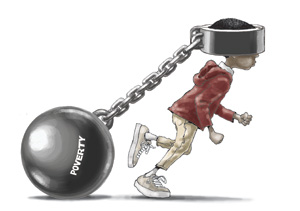Memphis Mayor A C Wharton recently talked to Tennessee Governor Bill Haslam about toxic stress, brain development, and epigenetics. The mayor may not have used those actual words, but in asking for the state’s help to fight Memphis’ intractable poverty, he was discussing them nonetheless.
In the meeting in the governor’s office in Nashville, Mayor Wharton mapped out his Blueprint for Prosperity, a 10-year plan to reduce Memphis’ current 25.4% poverty rate to the state’s rate of 16.5%.
The economic consequences for Tennessee are profound if Memphis is successful, because brain development and the futures of the children are now limited by the toxic effects of chaotic and unstable environments. That’s because children living in poverty are at risk for a host of poor child and adolescent outcomes, especially if that poverty occurs early in childhood, and this early stress can have a significant impact on adult outcomes too.

Scientists have discovered that a child’s environment from conception to early childhood affect a child’s biology by creating toxic stress that becomes biological memories. It is now known that a phenomenon called epigenetics, the study of changes in gene activity that do not involve alterations to the genetic code itself, is a mechanism that can account for how early stress can result in long term consequences. In other words, epigenetics helps explain how powerful negative environmental and home conditions – diet, stress, prenatal nutrition – can leave an imprint on genetic material that can result in adult health issues years later. Conversely, positive early childhood experiences can help protect a child from stress related responses that potentially could have adverse effects.
An over-active stress management system can cause disruptions in the development of brain circuitry and increase risk of a compromised immune system, hypertension, heart disease, obesity, substance abuse, and mental illness. In other words, early childhood experiences have life-long effects.
When young children develop in toxic environments associated with poverty, their brains naturally make survival their top priority. The result is that parts of the brain associated with survival are prioritized, rather than areas of the brain that control higher order thinking and reasoning.
The result is that insult is added to injury. A child born into a disadvantaged environment also has a more difficult time learning. Recent studies show, for example, that young children exposed to high levels of domestic violence have IQs at age 5 that are up to 8 points lower than those of otherwise similar children.
These are disturbing findings for a nation where, one in five children live in poverty; and even more so for Memphis, where more than half of children are born into poverty, and a third of children will live in poverty their entire childhood. It is clear that poverty has unfortunate implications for early brain development.
The good news is that we know what works: interventions. There are evidence-based educational interventions that help to enhance children’s skills and help them catch up to the cognitive and academic performance of more affluent peers. The best of these programs include both children and their parents and show greater returns than programs that target children alone Equally important, such interventions can positively influence the development of non-cognitive skills as well as the cognitive.
Mayor Wharton told Governor Haslam that the challenge of poverty in Memphis can only be attacked with an interlocking web of city and state interventions that include a focus on early child development and kindergarten readiness, job training, housing, better health, public safety, neighborhood redevelopment, and more.
The mayor is on track, and we need look no further for a measurement of success than unlocking the potential of every child in Memphis. It is the right conversation at the right time for Memphis … and for Tennessee.
Previously posted as Perceptions by The Urban Child Institute.




Where can one find Mayor Wharton’s ten year plan to reduce Memphis poverty please?